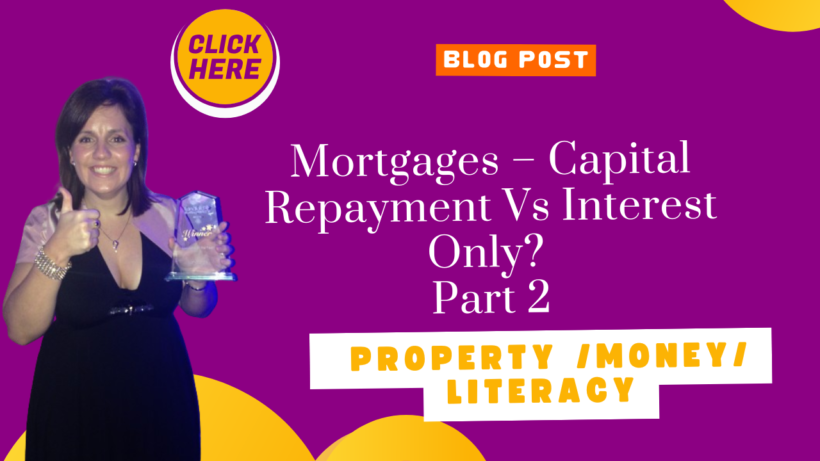Part 2: Choosing the Right Mortgage for Your Financial Goals
Welcome back! In Part 1, we explored the story of a woman deciding between an interest-only or capital repayment mortgage. We covered the basics, discussed cash flow, and looked at the importance of financial discipline and long-term planning. Now, let’s dive deeper into how these mortgage types affect residential buyers versus property investors, explore practical strategies to make the right choice, and discuss how your mindset and behaviours play a critical role.

Residential Buyers vs Property Investors
For residential buyers, capital repayment mortgages are often the default choice, and banks frequently require them. This is partly because they reduce the outstanding debt over time, ensuring that by the end of the term, the homeowner owns the property outright. For many, this brings a sense of security and peace of mind, knowing the debt is steadily reducing month by month.
For property investors, however, the landscape is different. Interest-only mortgages are often the preferred choice because of the flexibility they offer. Lower monthly payments free up cash that can be reinvested into additional properties, used for refurbishments, or held as a buffer for unexpected expenses. This approach allows investors to grow their portfolios more quickly.
Take buy-to-let properties as an example. Many investors find that rental income comfortably covers the interest payments on their mortgage. This creates a positive cash flow that can be channelled into other investments or saved for the future. However, it’s important to have a plan for repaying the capital, whether that’s selling the property, using savings, or refinancing.
“A goal without a plan is just a wish.” – Antoine de Saint-Exupéry
If you’re an investor, it’s not enough to aim for flexibility—you need a clear plan for how you’ll handle the capital repayment when the time comes.

Flexibility vs Certainty
The flexibility of an interest-only mortgage can be a game-changer, especially during uncertain times. I experienced this first-hand during COVID-19. My interest-only mortgages allowed me to keep the capital element back for working cash flow. This meant I could focus on keeping my businesses running without worrying about high monthly repayments.
However, flexibility requires discipline. Without it, the extra cash flow can quickly disappear into everyday expenses, leaving you unprepared when the loan term ends. This is where the certainty of a capital repayment mortgage can be appealing—it forces you to stay on track, paying down the debt automatically each month.
“The chains of habit are too weak to be felt until they are too strong to be broken.” – Samuel Johnson
If you know you’re prone to spending rather than saving, a capital repayment mortgage might be the better choice for you. It’s a “set and forget” solution that aligns well with human behaviour.
Key Questions to Ask Yourself
To decide which mortgage type is right for you, consider these questions:
- What are your goals? Are you looking for stability, or are you aiming to grow your property portfolio and maximise cash flow?
- What’s your cash flow situation? Can you comfortably manage higher monthly payments, or do you need the breathing room that an interest-only mortgage provides?
- Are you financially disciplined? Will you use the flexibility of an interest-only mortgage to your advantage, or could it lead to poor financial habits?
- What’s your repayment plan? If you choose an interest-only mortgage, how will you repay the capital at the end of the term?
“By failing to prepare, you are preparing to fail.” – Benjamin Franklin
The right choice will depend on your unique financial situation, goals, and mindset.

Behaviour and Discipline: The Deciding Factors
The key difference between these two mortgage types often comes down to behaviour. Interest-only mortgages can be a powerful tool when used wisely, but they’re not suitable for everyone. If you’re disciplined and proactive, the flexibility can help you achieve more with your money. However, if you prefer structure and certainty, a capital repayment mortgage provides the reassurance that your debt is steadily reducing.
One of my favourite lessons about discipline comes from the world of sports. Olympic athletes train for years with no guarantee of success, relying on consistency and focus to achieve their goals. This is true of property investing as well. You may not see immediate results, but disciplined habits will pay off over time.
“Success is the sum of small efforts, repeated day in and day out.” – Robert Collier
In property investment, those small efforts might include setting aside a portion of your rental income to overpay on an interest-only mortgage or regularly reviewing your finances to stay on track.
A Balanced Perspective for Investors and Buyers
If you’re a residential buyer, the certainty of a capital repayment mortgage may outweigh the flexibility of an interest-only mortgage. This is particularly true if you’re not confident about managing money or prefer the security of owning your property outright by the end of the term.
If you’re an investor, the decision may hinge on your ability to manage cash flow effectively. An interest-only mortgage can free up resources to grow your portfolio, but it requires a clear plan for repaying the capital. Without that, you risk being unprepared when the loan term ends.
As Phil Jackson wisely put it:
“The strength of the team is each individual member. The strength of each member is the team.”
In this case, your “team” includes your financial habits, your mortgage type, and your repayment strategy. When they all work together, you’re set up for success.

One Decision Among Many
Choosing the right type of mortgage is an important decision, but it’s just one piece of the puzzle when buying a property. There are many other factors to consider, from legal requirements to budgeting and beyond.
That’s why I’ve created a comprehensive Property Buying Checklist to help you cover all the bases. Download it today and make sure your next property purchase is set up for success.
Join My Community
If you’re navigating mortgage decisions or looking for expert advice on property investment, join my email list. I share actionable tips, strategies, and real-life stories to help you succeed.
Conclusion
Ultimately, choosing between an interest-only and a capital repayment mortgage is about understanding your financial goals, habits, and resources. The right choice for one person might not work for another, but with careful consideration and a clear plan, you can set yourself up for long-term success.











